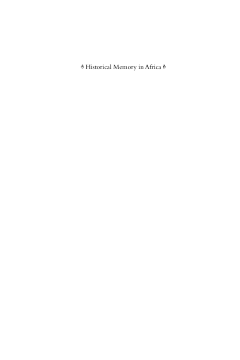
Additional Information
Book Details
Abstract
A vast amount of literature—both scholarly and popular—now exists on the subject of historical memory, but there is remarkably little available that is written from an African perspective. This volume explores the inner dynamics of memory in all its variations, from its most destructive and divisive impact to its remarkable potential to heal and reconcile. It addresses issues on both the conceptual and the pragmatic level and its theoretical observations and reflections are informed by first-hand experiences and comparative reflections from a German, Indian, and Korean perspective. A new insight is the importance of the future dimension of memory and hence the need to develop the ability to ‘remember with the future in mind’. Historical memory in an African context provides a rich kaleidoscope of the diverse experiences and perspectives—and yet there are recurring themes and similar conclusions, connecting it to a global dialogue to which it has much to contribute, but from which it also has much to receive.
Bernard Lategan is the founding Director of the Stellenbosch Institute for Advanced Study. He studied classical languages, linguistics, literary theory, and theology at universities in South Africa, Europe and North America and specializes in hermeneutics, values studies and social transformation.
Mamadou Diawara received his PhD from École des Hautes Études, Paris and is Professor at the University of Frankfurt/Main. He specializes in anthropology and African history (oral history and the history of development).
Jörn Rüsen was President of the Kulturwissenschaftliche Institut in Essen (Institute for Advanced Study in the Humanities at Essen) and is now Senior Fellow there and Professor emeritus of History and Historical Culture at the University of Witten-Herdecke.
